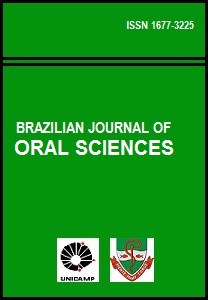Abstract
Culturally different population groups have distinct infant feeding practices, which presumably may be related to diverse occlusal features in the primary dentition. Aim: To investigate the associations between nutritive and non-nutritive sucking habits and the prevalence of anterior open bite, in children from Aragua-Venezuela and São Paulo-Brazil. Methods: Seven calibrated examiners (κ = 0.89-1.0) performed clinical assessments in Venezuelans (N = 809) and Brazilians (N = 1,377) aged 3-6 years. Sucking habits were investigated using questionnaires answered by the mothers. Data were analyzed using logistic regression models (α = 0.05). Results: Among 380 children with anterior open bite, 309 were Brazilians. Approximately 65% of Brazilians with pacifier-sucking habit lasting beyond 3 years of age had this malocclusion. Brazilians who prolonged pacifier and digit-sucking habits beyond 3 years of age have, respectively, 68.5 and 14.5 times more chances of presenting anterior open bite than children without sucking habits (p < 0.001). In Venezuelans with open bite, 37.7% had digit-sucking habits beyond 3 years of age, resulting in a high odds ratio (9.3; p < 0.001) when compared to children without this habit. No significant effect was found for bottle feeding. However, non-breastfed Venezuelan children or those breastfed for periods shorter than 6 months have a two-fold higher chance of presenting anterior open bite than children who were breastfed for longer periods, p = 0.008. Conclusions: Infant feeding had some effect on Venezuelan children, since insufficient breastfeeding was related to a higher prevalence of anterior open bite. Pacifier-sucking was more prevalent in Brazilians, corresponding to pronounced chances (8-68 times greater) of diagnosing anterior open bite in pacifier users compared to non-users. Among Venezuelans, on the other hand, digit-sucking effect surpassed that of pacifier use and was associated with far higher chances (6-9 times) for this malocclusion.
This work is licensed under a Creative Commons Attribution 4.0 International License.
Copyright (c) 2015 Andréia Carvalho Cardoso, Marisela González de Bello, Flávio Vellini-Ferreira, Rívea Inês Ferreira-Santos
Downloads
Download data is not yet available.

